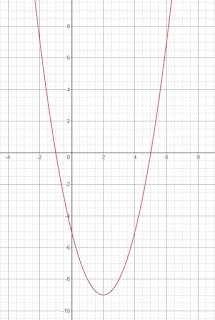Graphing Quadratics
This is a simple guide to graphing quadratics
A quadratic equation is most often given in one of two forms as shown below.
- Standard form: y = ax^2 + bx + c
- Vertex form: y=a(x-h)^2 + k
For the standard form ( y = ax^2 + bx + c) follow the steps below to graph
- Find the vertex
- Do -b/2a to find the x-coordinate of the vertex
- Plug in the value from -b/2a into the original equation to solve for the y-coordinate of the vertex
- Graph the vertex
- Graph a point before and after the vertex
- Choose an x-coordinate before the x-coordinate of the vertex
- Plug this value into the original equation to find the value of the y-coordinate
- Graph the point
- Repeat a-c with an x-coordinate after the x-coordinate of the vertex
For the second form ( y=a(x-h)^2 + k) follow the steps below to graph
- Find the vertex
- Graph the vertex
- See step 2 from graphing a quadratic equation in standard form
An example problem is y=x^2-4x-5
- Find the vertex
- X-coordinate is -b/2a = 4/(2(1)) = 2
- Y-coordinate = 2^2 -4(2) - 5 = -9
- The vertex is (2,-9)
- Find a point before and after vertex
- If x = 1, y = 1^2 - 4(1) - 5 = -8 so (1,-8)
- If x = 3, y=3^2 -4(3) - 5 = (3,-8)
- The final graph is shown

Comments
Post a Comment